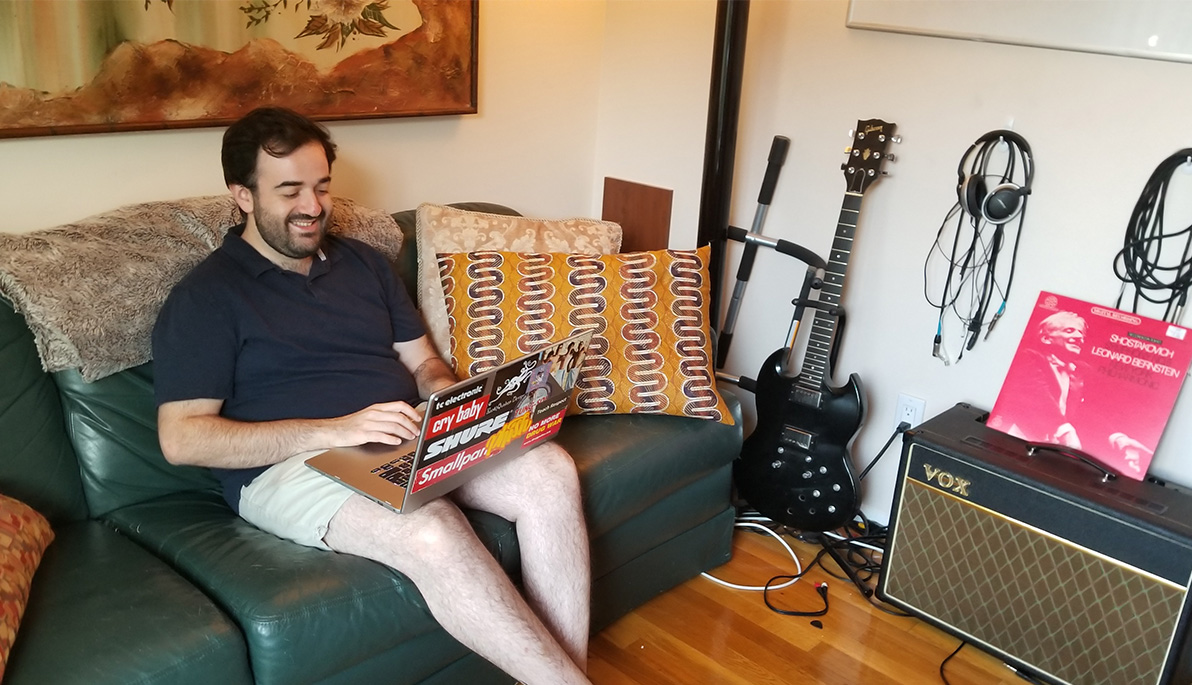
Student Profile: Ian Krivoruk

Hometown: Plainview, N.Y.
Major: M.S., Electrical and Computer Engineering
Year Expected to Graduate: December 2018
Campus: Long Island (Old Westbury, N.Y.)
Rock Star Engineer
For Ian Krivoruk, the decision to pursue electrical and computer engineering at NYIT College of Engineering and Computing Sciences was all about his love of music.
“I actually switched my major from creative writing at a different university to physics, which was my strongest area in high school,” he says. Krivoruk ultimately settled on electrical engineering as a pragmatic way to support his music and electronics hobby. “I wanted to build guitar pedals and amps, so I figured that electrical engineering would provide me with the necessary training.”
He sat down with The Box to talk about his journey.Why did you choose NYIT?
I really valued NYIT’s diverse student body. I believe being immersed and surrounded by so many people from all cultures and walks of life is the key to expanding one’s way of thinking and world view. For me, it is truly what the notion of higher education is.
Can you describe a project or challenge you encountered recently that was interesting?
I’ve never been confident in my programming skills, so I’ve forced myself to really put my nose to the grindstone when it comes to coding. For my senior project, I’m writing a code that will scan brainwaves and then control a sound accordingly. I rewrote it in three different languages. This not only keeps my abilities sharp, but also gives me the hands-on learning experiences that teach best practices and how to identify the right tool for the job, so to speak.
What activities are you currently involved in at NYIT?
I conducted research with Associate Professor Sabiha Wadoo, Ph.D., on nonlinear control theory and dynamic control of autonomous vehicles. I have also assisted graduate students in their research as well as expanded upon previous theses. Control theory, as well as probability, are the two areas of electrical engineering I find most fascinating, and gaining hands on research experience vastly opened my eyes to alternative ways of learning, discovering, and tackling problems.
In addition to my coursework and research, I work both as a tutor at the NYIT Learning Center and as an IT supporter at Academic Computer Services.
You received the Samuel Pakrad Scholarship. What has this meant to you in the course of your academic career?
It goes without saying that it is truly a humbling award both for me and my family, and anybody who has supported me throughout my academic career. The lessening of the inevitable financial burden one assumes after attending higher education is just such a relief and every little bit helps. Every second I don’t spend worrying about how I will afford school can be spent bettering myself either through my studies or engagement.
What’s next for you after you graduate?
Currently, I am working as a radio frequency engineer at T-Mobile. A master’s degree is without question something I plan to pursue immediately. I have dozens of career goals, ranging from full-time professor to rock star, but so long as I’m thinking critically and analytically in my career, using data to create a better tomorrow, or teaching and sharing knowledge, I’d be happy.
What is one thing about you people might be surprised to find out?
I’ve been to at least 250 concerts in my life, probably more. I’ve seen one band, Phish, 75 times alone! Music has always been and always will be my passion, and playing music and attending concerts is how I spend 90 percent of my free time.
You’re now in the final stretch of your academic career. What advice do you have for incoming students?
Do not commit to a major you don’t love. I see too many people choosing majors because they heard it will earn them a lot of money or because their parents told them to. If you don’t love what you study, it will be so much harder to be good at practicing it; but if you love it, your chances of being successful are much higher.
This interview has been edited and condensed.









